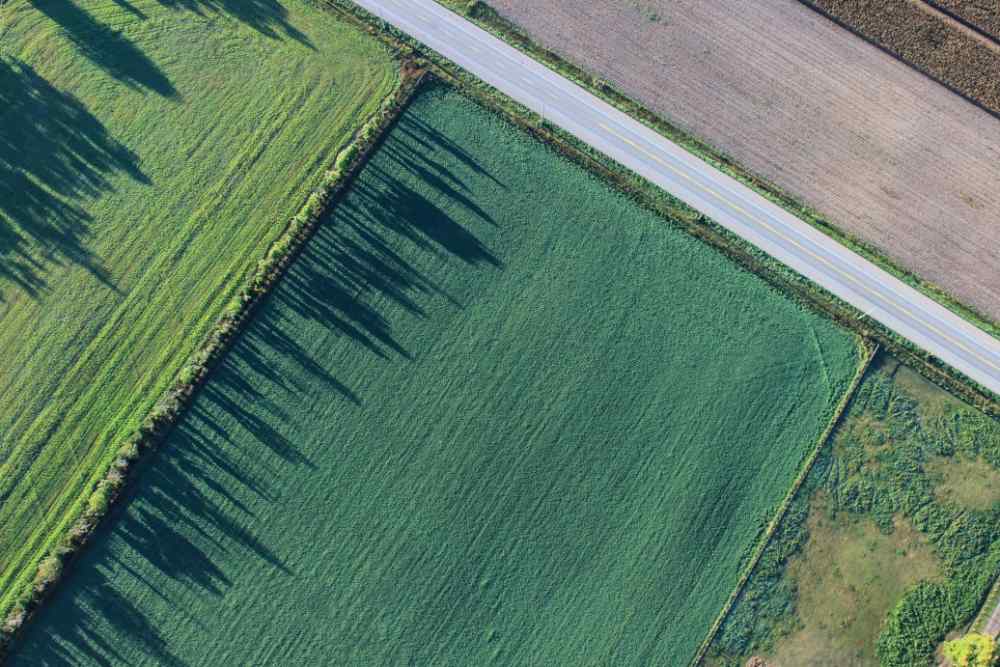The outbreak of the Covid-19 pandemic is one of the epochal events in which every savvy real estate investor today is venturing out to include a variety of properties in their holdings, including residential real estate, commercial real estate, or farmland real estate for their investing purposes.

These investors are very much aware of the advantages of having real tangible assets which are backed by underlying land. Most favored by them for high stable returns on investment and good appreciation is often buying a commercial property in metro cities or buying agricultural land. However, there are many myths in the market faced by young investors. For e.g. Undeveloped land is a long-term investment that won’t pay off for years and it’s also harder to get loans on these lands.
While for commercial properties, most people think they don’t have the same fluency outside of the agricultural property. Hence here, we will try to outline the differences and similarities between Farmland investing and commercial real estate investing.
Compare and Contrast – Commercial Real Estate and Farmland Investing
Both, commercial real estate investing and farmland investing require a longer time horizon but offer good stable returns on investments in the long-term. Like commercial investing, farmland investing is also very less sensitive to market changes in comparison to the stock market. Both of these have become lucrative instruments of investment for every alternative investor in the current pandemic situation, however, both come with little liquid value and high cost-to-entry.
There are active and passive options for earning income in both these investments. Like in commercial real estate, more than 25 to 35 percent of people rent their own properties for rental income. Similarly, nowadays the same percentage of people owning farmland plots are renting out their farms for rentals.
Talking about appreciation value, they both again functions similarly in providing solid returns from appreciating the value of the land. Hence, in commercial real estate and agricultural land, yields can be earned from rentals, returns on appreciation, and developments on the land.
Above are the similarities between the two, now let’s look in detail at how both of these are structured differently from each other.
Commercial Real Estate Investing

There are different kinds of commercial properties that are available like retail and office spaces. Investors can buy both retail and office spaces on basis of the area requirement such as small-sized (100 sqft to 500 sqft), medium-sized (500 sqft to 3000 sqft), and large-sized (>3000 sqft).
Key points of Commercial Real Estate Investing are as follows –
Higher rental yields
The rental yield is generally higher at an average of 7 to 12 percent p.a. in free-standing high street outlets and shopping malls, compared to 2 to 3 percent p.a. yield that residential property offers. This segment also offers options of high risk/high reward such as house flipping which can earn a lot of upfront income in a relatively shorter time. Another affordable option is you can buy shares in REITs, ETFs, Mutual funds where you get to select a portfolio of properties that are managed on your behalf.
Higher returns in prime locations
For higher rentals and returns, footfalls of the location play an important role while selecting a property. If the location is on a high traffic intersection, it might perform better in a diversified growing economy compared to economically depressed areas.
Higher cost-to-entry and maintenance
Definitely, there is a huge entry barrier in terms of the amount of money you need to enter this sector. You may have to drench into your reserve funds or borrow money to acquire a property and fix it up which can take anywhere from several weeks to several months. This kind of commercial investment needs hands-on management companies for upkeep and maintenance of the building in order. Including lease terms and market norms which vary across real estate types, can impact overall investor’s operating expense.
Regular income flow
In the case of commercial real estate, there is no running around to get rents. And, it is easy to deal with tenants or entities as these are generally corporates, banks, or retail chains. Hence, Commercial properties offer regular and more consistent income sources than other real estate segments.
Fewer tax benefits
Unlike agricultural land property, there are very few tax incentives for an investor of commercial property. The profits from the sale of your property used for business becomes taxable as short-term capital gains. There is no tax rebate or tax benefit on the EMI for loan repayment.
However, you can claim an exemption under section 54F by re-investing the net consideration in a residential property, if the same has been held for more than 24 months. Please note, there is no deduction in section 80C in a home loan taken for commercial property as it is available only for residential property.

The Income Tax Act allows a deduction for income from commercial property (rented out) under the standard deduction for repairs, insurance, electricity, water supply, etc. Also the deduction on the interest paid on loans for such properties under Section 24.
You can also read our article on things to consider before buying commercial real estate. Click here to read
Farmland Investing
Agriculture offers many of the same benefits and helps diversify the asset portions of a portfolio. It is a more easily accessible investment opportunity. Over 12% of the land on earth is used for farming today. This is even higher in countries like India, China, and America.

Key points of Farmland Investing are as follows –
Good returns through Farm REITS and Crowdfunding
Like commercial real estate, there are also options to invest in farmland real estate investment trusts (REITs). REITs are traded like a stock where the government has planned some future infrastructure projects.
Another alternative that emerged in 2012 is farm crowdfunding where you can make money from small investments. When you invest through farm crowdfunding, you get all the benefits of investing in large commodities at a much lower risk. And, You also get direct ownership without getting agriculture expertise.
Earnings through Crop production
The traditional way of generating income through farmland is with an increase in farmland values and, crop yields or cash rental payments. Farmland can provide fantastic yields in the future through specialty crops, row crops, timber, livestock operations including vertical and urban farming. The non-volatile nature of market trends means less risk to farmers.
This allows them to consider consumer and price trends prior to the selection of plant crops for the year. When agriculture prices drop, so do land values. That is why agriculture never faces a bubble market like the one that happened before the 2007-2008 financial crisis.
High appreciation value
As per one of the articles of Indian Express, farmland prices in India have increased from 3 folds to 100 folds since the year 2000. As per investors, a desirable farm must have good soil, access to water, a favorable climate, and proximity to infrastructures like roads or processing facilities.
Lesser operating expense
Here, tenants are responsible for taxes, most insurance, and maintenance covered under net leases used in farms. This means relatively lower operating expense to owners, unlike commercial property. Also, land properties maintain their intrinsic values even during the recession.
Better tax benefits
Agricultural land comes with more tax benefits, not available in commercial real estate investing. Farmland in rural areas in India is not considered a capital asset. Hence, any profits from the sale are not taxable under the head Capital Gains. Under Section 10(37) of the Income Tax Act, Capital Gains received on compulsory acquisition of urban agricultural land are exempted from tax.
Besides all the advantages you read above, there are unavoidable disadvantages also in buying a land property. As per the law, you need to be a farmer to own agricultural land. However, this prerequisite is eased by many states. You cannot convert a fertile land into a residential one as the land needs to be dry. There are even restrictions in some states on ownership of land under the Land Ceiling Act. Buying can be very difficult if you are not aware of the land legal laws of that state.
Favorable locations in India for investing in Commercial Real Estate and Farmland

For commercial real estate investment, there are many locations that you can explore for investing in offices or retail spaces. Some of them are recommended by consultants and management companies which include Delhi-NCR, Mumbai, Bengaluru, Pune, Hyderabad, and Chennai.
For agricultural land property, Punjab is the best state for agriculture purposes. Its land is fertile and irrigated by the river. You can also look around Madhya Pradesh where Opium and cotton are grown due to black soil found here. Here you can purchase the land at cheaper rates than other states. Chhattisgarh is another good option for the fertile land property at reasonable prices.
However, you need to check the legislation of each state and remain cautious in case of buying large portions of land in interior places. This is important because these would have multiple family stakes in them. In that case, there are chances of legal obligations on the buyer. It is recommended to consult a reputed lawyer before buying land in these areas.
You can also refer to our article on “Important terms used in Real Estate” to know more about Real Estate. Click here to read
Final Word
In many ways, commercial real estate investing and traditional farmland investing function similarly. They can be a great option for an active and passive income source. Investors can enjoy both rental income and appreciation on these two types of properties, basis on their ability to adjust risks.
We know that finding a property that fulfills all your needs can be a challenging task if we lack correct information. Therefore, here in this writing, we have tried our best to provide you with details and facts for your better judgment. Please share this article if you liked and comment your suggestions in the comments section below.





